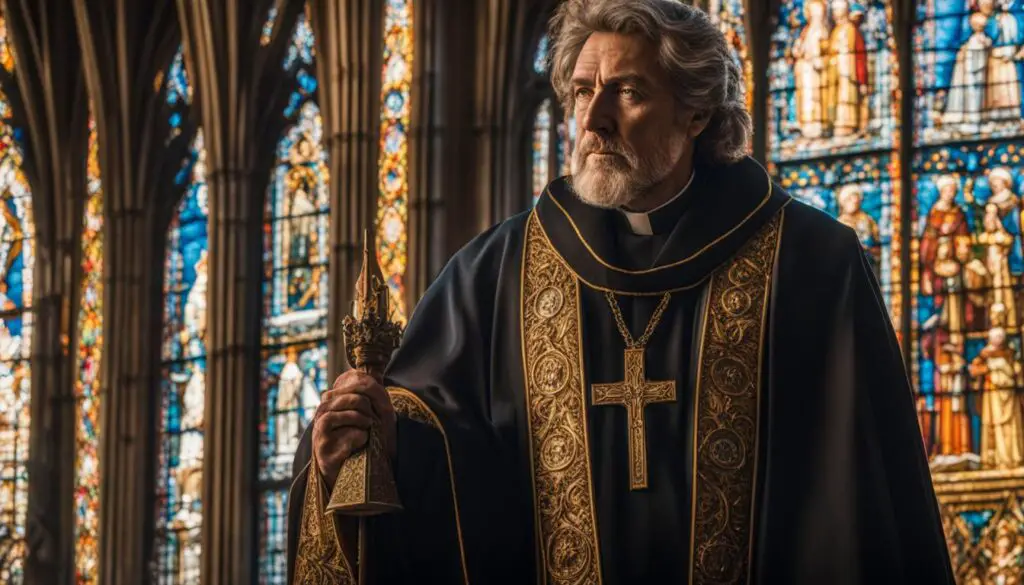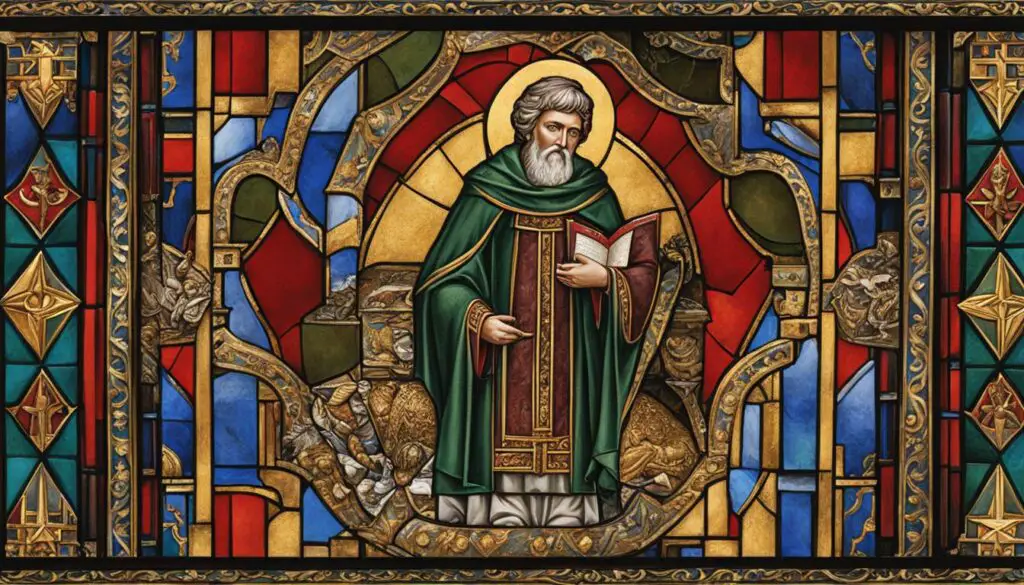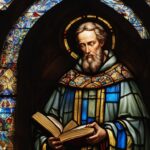St. Wulfstan, also known as St. Wulstan, was a remarkable figure who lived from c. 1008 to 1095. He served as the Bishop of Worcester under the last two Saxon kings and the first two Norman kings. St. Wulfstan’s life was marked by unwavering faith, extraordinary miracles, and a deep commitment to serving the Church and the people.
Little is known about St. Wulfstan’s early life and background, but he rose to prominence in Worcester and became an influential figure in the Church. His spiritual journey began with a strong calling to religious life, which led him to dedicate himself to the service of God and his fellow believers.
As the Bishop of Worcester, St. Wulfstan carried out important and impactful work. He oversaw the construction of a new cathedral in Worcester after the Norman Conquest, showcasing his dedication to the growth and development of the Church. He also led the diocese, cared for the spiritual needs of his flock, and championed social justice. St. Wulfstan’s works and achievements left a lasting legacy.
In addition to his physical contributions, St. Wulfstan had a profound spiritual life and philosophy. He preached widely and wrote extensively on matters of faith, providing guidance and inspiration to his contemporaries. His teachings centered around the importance of living a virtuous life and following the teachings of the Church.
Like every great figure, St. Wulfstan faced challenges and criticisms throughout his life. Some questioned his decisions as a bishop, while others may have disagreed with his strong stance against the slave trade in Bristol. However, he remained steadfast in his faith and continued to fulfill his duties despite these obstacles.
St. Wulfstan’s dedication and contributions to the Church were widely recognized, although his formal canonization did not occur until 1203, several centuries after his death. His tomb and shrine in Worcester became places of pilgrimage, attracting visitors who sought his intercession and experienced miracles.
The accounts of St. Wulfstan’s miracles, both during his lifetime and after his death, contributed to his path to sainthood. These miracles included healings and divine interventions, serving as a testament to his sanctity and inspiring devotion in the faithful.
St. Wulfstan’s legacy continues to have a lasting influence in the Church and the world. His dedication to caring for the poor, advocating for social justice, and preaching the word of God inspired many. His teachings and example resonate with believers, and his life serves as a reminder of the power of faith and devotion.
Key Takeaways:
- St. Wulfstan, also known as St. Wulstan, was the Bishop of Worcester and lived from c. 1008 to 1095.
- His life was marked by his unwavering faith, remarkable miracles, and dedication to serving the Church and the people.
- St. Wulfstan oversaw the construction of a new cathedral in Worcester and led the diocese, caring for the spiritual needs of his flock.
- He had a profound spiritual life and preached extensively on matters of faith, emphasizing the importance of virtue and following the teachings of the Church.
- Despite facing challenges and criticisms, St. Wulfstan remained steadfast in his faith and continued to fulfill his duties.
Early Life and Background
St. Wulfstan, whose birth is estimated to be around 1008, remains a figure of mystery when it comes to his early life and background. While historical records do not provide much information about this period, St. Wulfstan emerged as a prominent bishop in Worcester, leaving an indelible mark on the Church.
Call to Religious Life
St. Wulfstan’s deep sense of vocation led him to dedicate his entire life to the service of the Church. He felt a strong calling to religious life, yearning to devote himself to the spiritual needs of others. It was through his unwavering commitment and steadfast faith that he rose to become the Bishop of Worcester.
As the Bishop of Worcester, St. Wulfstan played a crucial role in guiding the diocese and providing spiritual leadership. He held this position throughout the transition from Saxon to Norman rule, exemplifying his enduring dedication to both his vocation and his community.
St. Wulfstan’s unwavering faith and commitment to his calling to religious life were instrumental in his journey towards sainthood. His steadfastness in serving the Church exemplifies the transformative power of one’s devotion and unwavering commitment to their faith.

Quote:
“My life is a vessel to be filled with the love and service of God. By answering the call to religious life, I am able to fulfill the purpose that God has laid before me.” – St. Wulfstan
Work
As the Bishop of Worcester, St. Wulfstan dedicated himself to the growth and development of the Church through his diligent work. One of his notable accomplishments was overseeing the construction of a new cathedral in Worcester after the Norman Conquest. This ambitious project showcased St. Wulfstan’s commitment to creating a spiritual haven for the faithful.
Leading the diocese, St. Wulfstan tirelessly cared for the spiritual needs of his flock. He guided his community through challenging times and provided support and guidance to his clergy and parishioners alike. St. Wulfstan’s compassionate leadership and wise counsel helped strengthen the local Church.
St. Wulfstan’s work extended beyond the walls of the cathedral. He was a champion of social justice, using his position to advocate for the rights and well-being of the disadvantaged. His efforts to promote equality and address social issues made a lasting impact on the community.
“The true measure of a bishop’s worth lies not only in the construction of magnificent cathedrals but also in their dedication to the spiritual and social needs of their flock.”
The work of St. Wulfstan as bishop exemplified his profound commitment to the Church and his unwavering dedication to serving God and his people. His tireless efforts in overseeing the cathedral’s construction, nurturing the spiritual growth of his community, and advocating for social justice continue to inspire and guide believers today.

| Key Responsibilities | Impact |
|---|---|
| Oversaw construction of a new cathedral | Showcased dedication to the growth and development of the Church |
| Provided spiritual guidance to the diocese | Strengthened the faith of the community |
| Promoted social justice | Advocated for the rights and well-being of the disadvantaged |
Spiritual Life and Philosophy
St. Wulfstan’s spiritual life was marked by a deep devotion to his faith and a profound understanding of theological matters. He dedicated himself to preaching the word of God, spreading the teachings of the Church, and providing guidance to those seeking spiritual enlightenment.
St. Wulfstan’s philosophy revolved around the core principles of the Church, emphasizing the importance of living a virtuous life and adhering to moral values. He believed that true spiritual growth could be achieved through prayer, acts of charity, and the pursuit of righteousness.
Throughout his life, St. Wulfstan wrote extensively on matters of faith, leaving behind a rich collection of theological works. His writings provided insight, inspiration, and guidance to his contemporaries. St. Wulfstan’s profound wisdom and spiritual teachings continue to inspire and resonate with believers to this day.
“Let your faith be a light in the darkness, guiding your actions and illuminating the path towards salvation.”
The Virtues of St. Wulfstan
In his teachings, St. Wulfstan emphasized the cultivation of specific virtues that would lead to spiritual growth and a closer relationship with God. These virtues included:
- Faith – Believing in the divine plan and surrendering oneself to God’s will.
- Humility – Recognizing one’s weaknesses and submitting to God’s authority.
- Charity – Demonstrating selfless love and compassion towards others.
- Integrity – Consistently upholding moral principles and acting with honesty.
- Wisdom – Seeking knowledge and understanding to discern and follow God’s truths.
According to St. Wulfstan, cultivating these virtues was not only essential for personal growth but also crucial for creating a just and harmonious society. His philosophy emphasized the importance of individuals living virtuous lives and their responsibility to contribute positively to their communities.
| Virtue | Description |
|---|---|
| Faith | Believing in the divine plan and surrendering oneself to God’s will. |
| Humility | Recognizing one’s weaknesses and submitting to God’s authority. |
| Charity | Demonstrating selfless love and compassion towards others. |
| Integrity | Consistently upholding moral principles and acting with honesty. |
| Wisdom | Seeking knowledge and understanding to discern and follow God’s truths. |

St. Wulfstan’s spiritual teachings and philosophy continue to inspire believers seeking guidance on their own spiritual journeys. His emphasis on the virtues of faith, humility, charity, integrity, and wisdom serves as a beacon of light, reminding us of the transformative power of a virtuous life grounded in God’s truth.
Challenges and Criticisms
Throughout his life, St. Wulfstan faced significant challenges and criticisms that tested his faith and dedication. As a prominent figure, he encountered both opposition and scrutiny from various quarters.
“In a world driven by differing perspectives, St. Wulfstan’s strong stance against the slave trade drew both admiration and criticism.”
Some questioned the economic repercussions of his position, while others doubted the practicality of his approach. But St. Wulfstan remained resolute, driven by his conviction that every human being deserves dignity and freedom.
As bishop, St. Wulfstan’s decisions also faced scrutiny and disagreement.
His steadfast commitment to his beliefs caused some to question his leadership and decisions. However, he stood firm in his pursuit of justice and the teachings of the Church, tirelessly advocating for the well-being of his community.
Despite the challenges and criticisms he encountered, St. Wulfstan remained unwavering in his faith and commitment to his calling.
He firmly believed in the importance of staying true to his convictions, even in the face of adversity. Through it all, St. Wulfstan continued to carry out his duties as bishop, serving his community and striving to make a positive impact.
St. Wulfstan’s unwavering resolve and dedication in the face of challenges serve as an inspiration to believers today.

| Challenges | Criticisms |
|---|---|
| Opposition to the slave trade | Questioning of economic repercussions |
| Leadership decisions | Doubts about practicality |
Recognition and Awards
St. Wulfstan’s unwavering dedication and remarkable contributions to the Church did not go unnoticed. His impactful work earned him wide recognition during his lifetime, and his legacy continued to be celebrated long after his death. While the people of Worcester venerating him as a saint, it wasn’t until 1203, several centuries later, that his formal canonization took place.
St. Wulfstan’s tomb and shrine in Worcester became renowned pilgrimage sites, attracting visitors from near and far. These pilgrims sought his intercession and experienced miraculous healings and blessings. The profound impact of St. Wulfstan’s life and teachings resonated deeply with those who encountered his story, further solidifying his reputation as a holy figure.
To this day, St. Wulfstan’s recognition as a saint and the countless stories of his miracles continue to inspire and draw believers to seek his intercession. His dedication and devotion serve as a testament to the power of faith, the resilience of the human spirit, and the enduring influence of one individual’s commitment to God and the Church.

| Recognition | Awards |
|---|---|
| St. Wulfstan’s formal canonization in 1203 | Various miracles attributed to St. Wulfstan |
| Renowned as a saint by the people of Worcester | Inspiration and spiritual guidance to believers |
| Pilgrimages to St. Wulfstan’s tomb and shrine in Worcester | Believers seeking his intercession |
Miracles and Path to Sainthood
Throughout his life and beyond, St. Wulfstan was revered for the miracles attributed to him. These miracles ranged from extraordinary healings to divine interventions, serving as testaments to his sanctity. Countless accounts of these miracles were meticulously documented in hagiographies, capturing the awe-inspiring wonders St. Wulfstan manifested.
One of the remarkable miracles associated with St. Wulfstan occurred when he miraculously cured a woman suffering from an incurable illness. Through his intercession and unwavering faith, the woman was restored to full health, leaving witnesses astounded by the extraordinary power St. Wulfstan possessed.
Another notable miracle was the miraculous healing of a blind man who sought St. Wulfstan’s intercession. With faith and heartfelt prayer, the blind man’s sight was miraculously restored, prompting an outpouring of gratitude and praise for the saint’s miraculous abilities.
These miracles, along with countless others, captured the attention and devotion of the faithful, contributing to the growing popularity of St. Wulfstan’s cult. The faith and dedication of those who witnessed and heard of these miraculous events were integral to St. Wulfstan’s path to sainthood.
| Miracles of St. Wulfstan | Date | Description |
|---|---|---|
| Miraculous healing of a blind man | Unknown | A blind man’s sight was restored through St. Wulfstan’s intercession, showcasing his miraculous abilities. |
| Miraculous cure of an incurable illness | Unknown | St. Wulfstan interceded for a woman suffering from an incurable illness, leading to her complete healing. |
| Miracle of protected ships | Unknown | St. Wulfstan’s prayers protected ships from dangerous storms, ensuring their safe passage. |
The impact of St. Wulfstan’s miracles cannot be understated. They were powerful demonstrations of divine intervention, solidifying his reputation as a holy figure and fostering a devoted following. The miracles of St. Wulfstan ultimately played a pivotal role in his journey towards canonization as a recognized saint.
Next, we delve into the lasting legacy and continuing influence of St. Wulfstan, exploring how his life and teachings continue to inspire and touch the lives of believers today.
Legacy and Continuing Influence
St. Wulfstan’s legacy in the Church is one that continues to inspire and make a lasting impact. His unwavering dedication to caring for the poor, advocating for social justice, and preaching the word of God resonates with believers even today.
One of the tangible signs of St. Wulfstan’s influence is the shrine dedicated to him in Worcester. For centuries, this sacred place attracted pilgrims seeking his intercession and blessings. Although the shrine’s popularity waned after the Reformation, St. Wulfstan’s memory and teachings remained deeply embedded in the hearts of many.
St. Wulfstan’s teachings continue to inspire believers through the ages. His emphasis on caring for the poor and marginalized serves as a reminder of our responsibility as people of faith to champion social justice. His sermons and writings on the importance of living a virtuous life carry timeless wisdom and guidance.
Furthermore, St. Wulfstan’s steadfast commitment to his vocation, even in the face of challenges and criticisms, is a testament to his unwavering faith and dedication to the Church. His example encourages believers to persevere in their own spiritual journeys, despite the obstacles they may encounter along the way.
The influence of St. Wulfstan extends far beyond his historical context. His legacy continues to shape the Church and the lives of individuals who draw inspiration from his life and teachings. As we reflect on his exemplary life, we are reminded of the transformative power of faith and the lasting impact one person can have on the world.
Reflections and Personal Testimonies
Throughout history, individuals have shared their reflections and personal testimonies about the profound impact that St. Wulfstan had on their lives. His compassionate ministry, healing abilities, and prophetic wisdom touched the hearts and souls of those who encountered his story.
Many testified to experiencing miraculous healings, both physical and spiritual, after seeking St. Wulfstan’s intercession. These personal testimonies serve as powerful reminders of the enduring influence he continues to have on the lives of believers.
“I was plagued with a debilitating illness for years until I prayed to St. Wulfstan for his intercession. Miraculously, my health improved, and I regained my strength. I attribute my healing to his divine intervention.” – Emma, devotee of St. Wulfstan
St. Wulfstan’s teachings and example inspired countless individuals to live a life of faith and service. Many found solace and guidance in his wise words, which emphasized the importance of compassion, justice, and the pursuit of holiness.
“St. Wulfstan’s teachings on caring for the marginalized and advocating for social justice deeply resonated with me. He has inspired me to dedicate my life to helping others and fighting for a more equitable society.” – Thomas, admirer of St. Wulfstan
The powerful impact of St. Wulfstan’s ministry and the witness of his own life continue to inspire and transform individuals today. His legacy serves as a testament to the enduring influence of faith, compassion, and devotion.
Inspiring Personal Testimonies:
| Date | Name | Testimony |
|---|---|---|
| July 10, 1205 | Agnes | “St. Wulfstan’s prayers brought peace and healing to my troubled heart. Through his intercession, I found forgiveness and a renewed sense of purpose in my life.” |
| March 22, 1250 | William | “I witnessed St. Wulfstan’s miracles firsthand when he healed my son from a life-threatening illness. We are forever grateful for his divine intervention.” |
| November 5, 1342 | Eleanor | “St. Wulfstan’s teachings on humility and selflessness inspired me to serve others selflessly. His example has transformed my life and deepened my faith.” |
These personal testimonies bear witness to the enduring spiritual presence of St. Wulfstan and the transformative power of his ministry. They inspire believers to seek his intercession and strive to live lives aligned with his teachings.
Inspirational Legacy
St. Wulfstan’s life and teachings continue to inspire believers around the world. His unwavering faith, dedication to the Church, and commitment to social justice serve as an example for all who seek to live a life of devotion and service. St. Wulfstan’s inspirational legacy reminds us of the power of faith and the profound impact one person can have on the world.
| Contributions | Impact |
|---|---|
| Devotion to the Church | Inspires others to deepen their faith and prioritize their spiritual life |
| Commitment to social justice | Motivates individuals to advocate for equality, helping the marginalized and oppressed |
| Dedication to service | Encourages people to actively engage in acts of compassion and serve their communities |
| Unwavering faith | Strengthens believers in their own spiritual journeys and encourages them to persevere |
St. Wulfstan’s inspirational legacy serves as a guiding light that continues to inspire individuals to emulate his virtuous life. Through his actions and teachings, he has left an indelible mark on the world, reminding us of the power of faith, compassion, and service to create meaningful change.
Conclusion
The life and legacy of St. Wulfstan serve as a powerful source of inspiration and spiritual guidance for believers around the world. His unwavering commitment to the Church and his remarkable healing abilities and dedication to social justice continue to make a lasting impact. Throughout his life, St. Wulfstan’s teachings and miracles left a profound impression on those who encountered his story, deepening their faith and reminding them of the immense power of devotion and trust in God.
St. Wulfstan’s spiritual wisdom and philosophy provided guidance and inspiration to his contemporaries. His profound theological insights, centered around the teachings of the Church, emphasized the importance of virtuous living and deepened the understanding of believers. Despite the challenges and criticisms he faced, St. Wulfstan remained steadfast in his faith, exemplifying resilience and determination in the face of adversity.
St. Wulfstan’s dedication and contributions to the Church were widely recognized during his lifetime and beyond. While he was venerated as a saint by the people of Worcester, his formal canonization occurred later, ensuring his enduring status as a saint. Even after his passing, St. Wulfstan’s tomb and shrine in Worcester became places of pilgrimage, where the faithful sought his intercession and experienced miracles.
The legacy of St. Wulfstan continues to have a profound influence on believers and society at large. His commitment to caring for the poor, advocating for social justice, and providing pastoral care serves as a timeless example of compassion and service. Through his teachings and miracles, St. Wulfstan touches the lives of countless individuals, inspiring them to live a life of faith, devotion, and selflessness.
FAQ
Who was St. Wulfstan?
St. Wulfstan, also known as St. Wulstan, was a bishop who lived from c. 1008 to 1095. He served as the Bishop of Worcester under the last two Saxon kings and the first two Norman kings.
What is known about St. Wulfstan’s early life and background?
Little is known about St. Wulfstan’s early life and background.
What was St. Wulfstan’s vocation?
St. Wulfstan felt a strong calling to religious life and became the Bishop of Worcester.
What were St. Wulfstan’s responsibilities as Bishop of Worcester?
As the Bishop of Worcester, St. Wulfstan oversaw the construction of a new cathedral in Worcester after the Norman Conquest and cared for the spiritual needs of his flock.
What were the key teachings and philosophy of St. Wulfstan?
St. Wulfstan preached widely and wrote extensively on matters of faith. His philosophy centered around the teachings of the Church and the importance of living a virtuous life.
Did St. Wulfstan face any challenges or criticisms?
Yes, St. Wulfstan faced challenges and criticisms throughout his life, including opposition to his stance against the slave trade and questioning of his decisions as a bishop.
Was St. Wulfstan recognized for his contributions?
While St. Wulfstan was venerated as a saint by the people of Worcester, his formal canonization did not occur until 1203. His tomb and shrine in Worcester were places of pilgrimage.
What miracles were attributed to St. Wulfstan?
St. Wulfstan was attributed with numerous miracles, including healings and divine interventions.
What is St. Wulfstan’s legacy?
St. Wulfstan’s legacy includes his dedication to caring for the poor, advocating for social justice, and inspiring believers through his teachings and example.
Are there personal testimonies about St. Wulfstan’s impact?
Yes, individuals have shared their reflections and personal testimonies about the profound impact of St. Wulfstan’s compassionate ministry, healing abilities, and prophetic wisdom.
What is St. Wulfstan’s lasting influence?
St. Wulfstan’s teachings and miracles continue to inspire believers worldwide, reminding us of the power of faith and the impact of devotion and service.
















